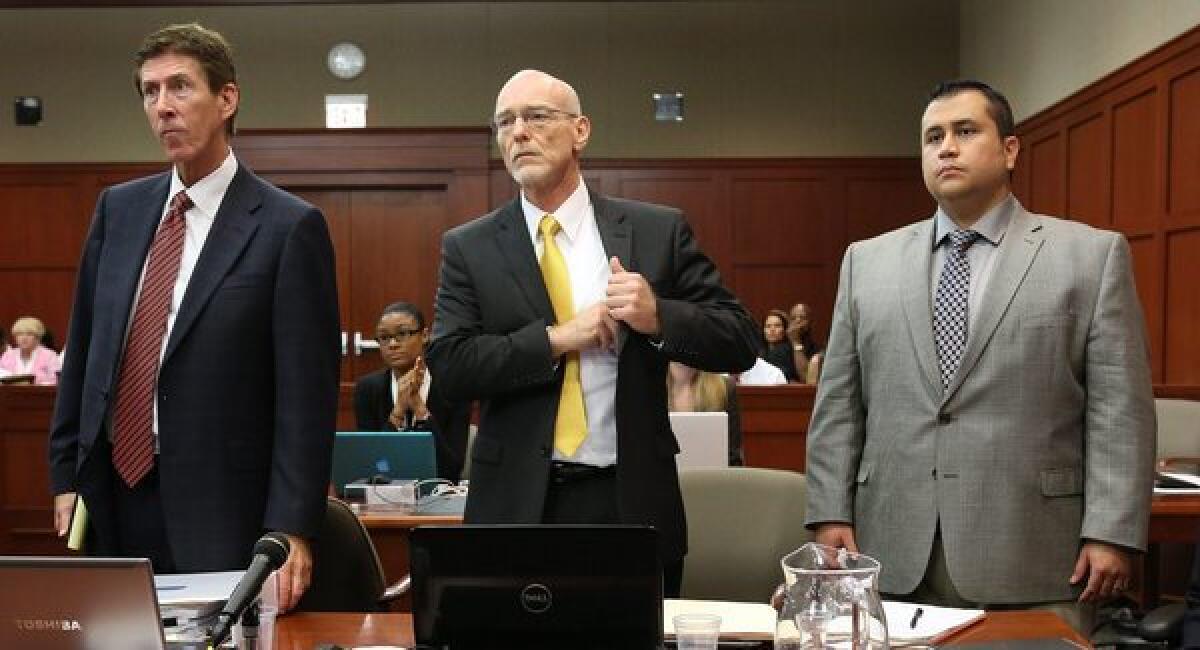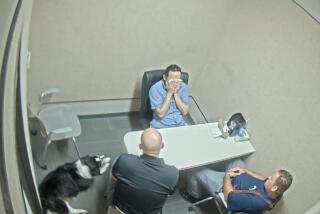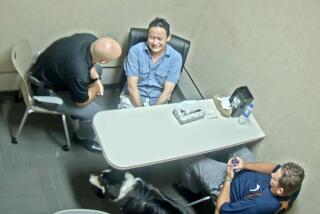Trayvon Martin case: Are police helping George Zimmerman defense?

Watching the George Zimmerman murder trial on TV is like being caught in a match of emotional ping pong as you try to anticipate what the jury is thinking: If the detective says Zimmerman never changed his story, does that make his claim of self-defense more believable?
If, on the night he put a bullet through Trayvon Martin’s heart, Zimmerman is heard telling a police operator, “These ... always get away,” does that demonstrate the ill will, hatred or spite required for a second-degree murder conviction?
Monday was truly a topsy-turvy day in court, as it seemed prosecution witness Sanford Police Det. Christopher Serino actually helped build the defense’s case when he said he believed that Zimmerman was being truthful when he told police he wished someone had videotaped his fatal encounter with Martin.
Medical examiner calls Zimmerman’s injuries ‘very insignificant’
Certainly, if someone who had just killed another wished for that, wouldn’t that mean his version of events was true? Wouldn’t the jury understand that he really was attacked by Martin and shot the young man only because he feared for his life?
But on Tuesday, prosecutor Bernie de la Rondia pounced. With Serino still on the stand, de la Rondia noted that Zimmerman, who helped found the neighborhood watch program in the small, gated development known as Retreat at Twin Lakes, must have known that there were no video cameras in his own development.
And certainly, de la Rondia pressed as he questioned the detective, Zimmerman knew that Martin was not videotaping the fatal encounter, since Martin held no camera during the altercation.
The prosecutor dismissed Zimmerman’s claim that he wished for a videotape of the killing, telling the detective: “He was bluffing you.”
Many legal commentators wondered aloud Monday whether there was a little bit of a payback going on in that courtroom when the two members of the Sanford Police Department, whom you would expect to be the best witnesses for the state, seemed to undercut the prosecution’s case.
They recalled that after the Sanford Police Department chose not to file even a manslaughter charge against Zimmerman, sparking a national outcry, the case was taken from the local police, and given by the state attorney to a special prosecutor, who decided to file the second-degree murder charges.
Then there was the issue of profiling. Had Zimmerman racially profiled a black teenager strolling home in a hoodie?
Serino had said he did not believe Zimmerman had racially profiled Martin when he placed a “non-emergency” call to police about him, parked his car, and got out to follow Martin.
But on Tuesday, the prosecutor asked whether following Martin despite the fact that there was no evidence he was committing a crime constituted profiling the young man “as a criminal.” The detective replied, “It could be construed as such.”
Like so many things about this emotionally taxing case, we will never know exactly what happened that night.
But I know I am not alone when I say that I am plagued by the same thought over and over:
Had Zimmerman stayed in his car that night, had he not decided to follow a young man who was walking home, had he not instigated the chain of events that led to a fight on a sidewalk 70 yards from Martin’s front door, that young man would still be alive today.
Like you, I am not in the courtroom, so I don’t know what the jury is thinking. But I believe, deeply, that juries almost always get it right.
ALSO:
Police fatally shoot Rottweiler; dog’s owner alleges retaliation
5 members of fallen Arizona firefighting team had California roots
Abcarian: Sarah Palin’s pointless attack on Marco Rubio, immigration reform
More to Read
Sign up for Essential California
The most important California stories and recommendations in your inbox every morning.
You may occasionally receive promotional content from the Los Angeles Times.











